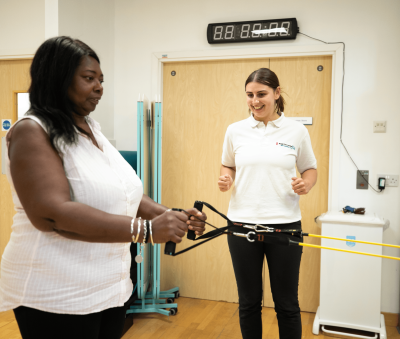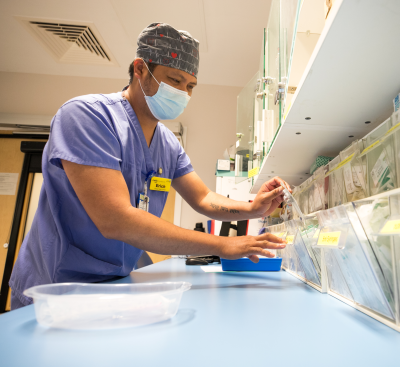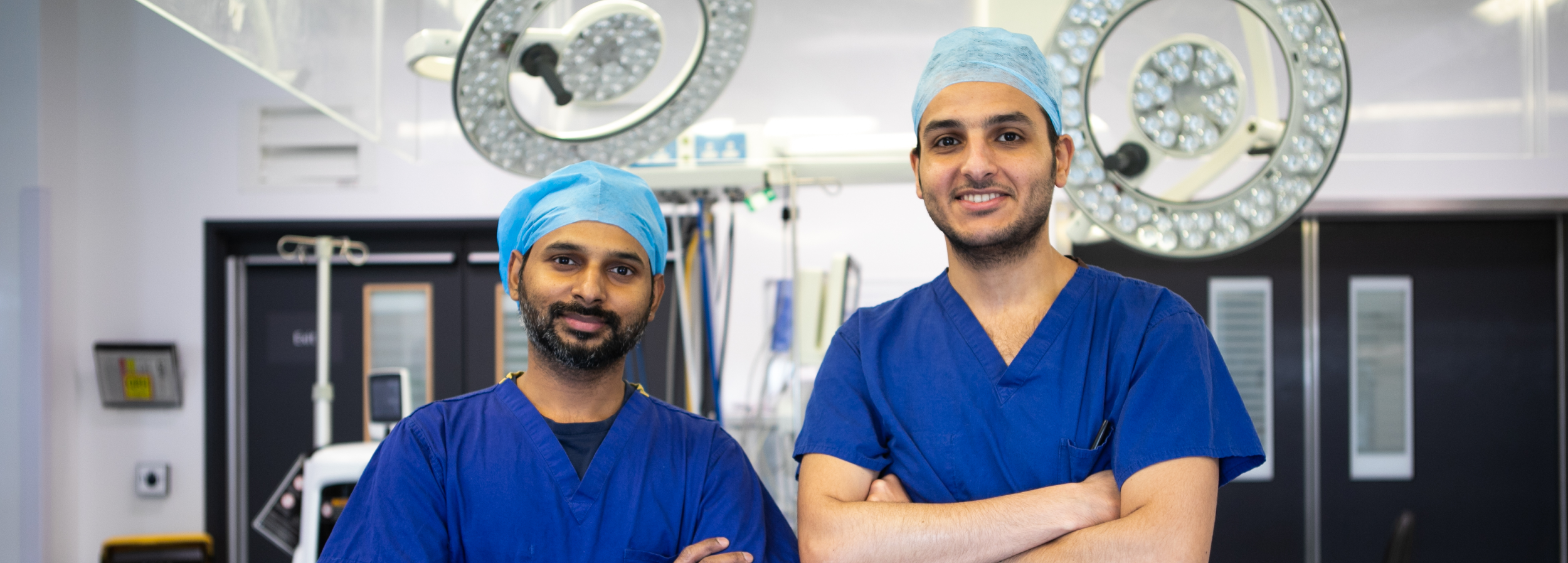Barnet Hospital
Our health landscape
Barnet’s ageing population, alongside its number of residents, presents particular health challenges. People living longer means that they need more care and support later in life.
The borough has a large and growing young population with 25% aged 0-19.
Other challenges include mental health, dementia, and access to urgent and emergency care.
Barnet is the largest borough in London with a population of roughly 389,100 residents. This is expected to rise to over 400,000 by 2030.
Age well
Barnet Hospital (BH) treats one of the largest elderly populations in London and the borough has more than 100 care homes.
We will build on our expertise, helping people to age well and prevent frailty, becoming a leading example within north central London and beyond with a focus on expanding services, research and innovation.
We will
- work with local partners to integrate primary, secondary, and community care services for the benefit of our elderly patients
- expand education and research to improve frailty care across all clinical services, helping staff to spot the signs of frailty earlier and provide interventions and treatment so that people can stay well and live independently for as long as possible
- introduce a new frailty team based in our new urgent and emergency area

Same day and integrated care
People are now living longer and experiencing more long term and complex health conditions. This means it is vital for us to work with our partners in primary, community and social care settings to address all aspects of our patients’ health.
It’s essential that pathways between different care providers are seamless, improving patient experience and getting the best possible outcomes for patients of all ages.
We will
- transform BH’s same day and integrated care, working with primary and community services to reduce unnecessary hospital visits and keep inpatient beds available for patients who need longer periods of care
- adopt telemedicine and hospital at home technology so patients get the care they need at home safely and conveniently, rather than being in hospital

Chase Farm Hospital and group clinical services
Our health landscape
There are significant health inequalities across the communities we serve which we can help address by providing early and accurate diagnosis for all our patients.
We are digitising our diagnostic services so we can better track patient health trends, identify at risk populations and prevent ill health at an early stage.
The Royal Free London has approximately 16,500 people on its surgical waiting list and many will visit CFH for their operation.
Early equitable diagnosis
CFH is one of the most digitally advanced hospitals in the UK and its group clinical services support patient care across the whole trust.
Our community diagnostic centre has carried out more than 200,000 tests since it opened in 2021.
We will
- use latest technologies such as artificial intelligence and data about our patients’ health to expand our clinical support services including imaging, diagnostics, therapies, and pharmacy
- detect and prevent diseases at an early stage, so we can improve outcomes for all our patients and local communities and reduce pressure on our hospitals emergency departments
- provide our local populations with equal access to diagnostics and treatment and become a leading centre for targeted therapies

Centre of excellence in elective surgery
CFH is one of NHS England’s eight elective surgical hubs and a leading centre for planned surgery across north central London, delivering high standards in clinical care.
We carry out more than 10,000 procedures a year.
We will
- build on our expertise in areas such as orthopaedics; urology; ear, nose and throat and maxillofacial; and gynaecology, to improve outcomes for patients and reduce waiting times
- use our electronic patient records and digital pathology services to streamline our patients’ care journey and reduce their time in hospital
- expand our elective surgery capacity so we can treat more patients than ever before and become an exemplar across the NHS

North Middlesex University Hospital and community services
Joining together as an organisation
North Mid merged with the Royal Free London group in January 2025.
We believe this merger enables us to improve services for our patients, the health of our local community and opportunities for our staff.
There has been strong engagement with our clinicians on the improvements that can be made possible by a new shared future and we have developed detailed cases for how merging will benefit patients, particularly in the areas of cancer care, planned surgery and research.
North Mid has developed three local clinical priorities: start well, live well, and age well.
Our hospitals continue to provide the same local services. At North Mid, these include the emergency department, maternity, intensive care, paediatrics, acute surgery, medicine and community services.
However, by coming together as one, we expect to be able to deliver:
- reduced waiting times
- improves access to specialty care locally
- better joined-up community services
- greater opportunities to benefit from the latest medical research and trials
- more coordinated action, with screening and early intervention services tailored to our different communities
The health landscape
Both Enfield and Haringey have very diverse populations, with around 40% of residents coming from black, Asian and minority ethnic backgrounds.
There are a number of local health challenges and inequalities:
Haringey has significant levels of inequality and deprivation. Some wards
in Haringey are among the least deprived, whilst others are amongst the most deprived in England
5% of adults over 65 have been diagnosed with dementia in Enfield – the highest prevalence in London, and higher than the rate for England
Diabetes prevalence in Enfield is the second highest of all London boroughs, and is above both the regional and England average
Haringey has higher rates of serious mental illness than other boroughs
58% of adults in Enfield are overweight or obese (2019/20), above the London average of 56%
North Mid serves more than 600,000 people living across Enfield and Haringey and the surrounding areas, including Barnet and Waltham Forest.
Start Well
There is a low uptake in childhood vaccinations – childhood obesity rates are higher than the national average and there is increasing demand for children and young people’s emergency services.
North Mid plans to consolidate its partnerships and care pathways to ensure the best start in life for children and young people, focused on supporting the most vulnerable communities and addressing health inequalities.
North Mid will
- focus on preventing ill health in its communities to reduce emergency department attendances
- work with partners to provide early intervention services for patients. Progress is already being made in this area with an ABC parents outreach group, which empowers parents to learn about child health and lifesaving skills

Live well
There are increasing demands on North Mid’s urgent and emergency care services, caused by cancer, cardiovascular disease, diabetes, liver disease and exacerbated by lifestyle factors such as smoking, alcohol, and physical inactivity.
Patients will be supported and treated throughout their lives, helping them to better manage long term conditions. North Mid will work with partners to tackle lifestyle behaviours to improve life expectancies.
North Mid will
- integrate its acute and community services to help identify high risk patients and support them to manage their long term conditions
- reduce risk factors that contribute to the main causes of death in local communities, such as smoking, alcohol consumption, and physical inactivity
- deliver integrated emergency and urgent care, with a focus on same day emergency care, frailty prevention and treating patients outside of hospital

Age well
The number of people aged 65 and over is expected to continue rising with more and more living with long term conditions such as dementia, cardiovascular disease and diabetes.
Ensuring patients can remain independent as long as possible will be paramount, with access to the best possible care. All staff should know how to identify frailty and help patients age well.
North Mid will
- work with its community staff and partners to keep people in the best possible health, preventing frailty and helping patients to age well. An Ageing Well guide, published in partnership with other NHS trusts, local authorities and patients provides a comprehensive overview of support services available to older people living in Enfield and Haringey
- focus on improving frailty care, by helping staff spot the signs of frailty at an early stage and treat patients so they can stay well and live independently for as long as possible

Royal Free Hospital
Our health landscape
Camden’s population continues to grow, with a predicted increase of around 22,600 people by 2029 and the biggest growth expected in the over 60s. This represents a growing pressure on local health and care services.
Around one in seven (14%) of Camden residents has a long-term health condition or disability that limits their day-today activities in some way.
Camden has a population of around 218,000 people, with over 40% of the population coming from black, Asian and minority ethnic backgrounds.
Live well
Around 430,000 people in north central London are living with one or more long-term conditions, with metabolic and respiratory illnesses, such as diabetes and asthma, making up 72% of these conditions.
The RFH is working with partners across North Central London Integrated Care System to reduce chronic disease, prevent unnecessary hospital admissions and improve patient outcomes.
We will
- use data to understand our local population’s health, identify factors that might be contributing to preventable diseases, and create tailored care for groups who might be more at risk of ill health
- embrace digital technology such as our electronic health records and virtual wards to improve communication between primary and secondary care and improve the care journey for our patients

Rare diseases
The RFH is a specialist centre for a number of rare diseases such as immunodeficiency,
haemophilia and amyloidosis.
Our clinical research facility and the Pears Building, the home of the Institute of Immunity and Transplantation, a partnership between the Royal Free London (RFL), University College London and the Royal Free Charity, ensures we can provide patients with access to the latest therapies.
We will
- establish the RFH as a national centre of academic and clinical excellence for rare diseases, with an aspiration to become a biomedical research centre for rare diseases
- become a top 10 research hospital with all staff and patients having excellent access, experience and outcomes because of world class clinical research

 Translate
Translate
